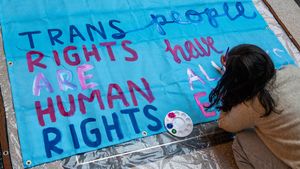
Revelers unfurl a giant Pride flag during a Pride parade in Brussels, Belgium, in 2024
Alexandros Michailidis/ShutterstockILGA-Europe has released its annual Rainbow Map for 2025, providing an analysis of LGBTQ+ rights and the climate for family in 49 European states. The group was created out of the International Lesbian, Gay, Bisexual, Trans and Intersex Association (ILGA World), the international advocacy group for the LGBTQ+ community.
ILGA-Europe researchers examined 49 countries using 76 criteria, which were then broken down into seven thematic categories:
- Equality and non-discrimination
- Family
- Hate crime and hate speech;
- Legal gender recognition;
- Intersex bodily integrity;
- Civil society space; and
- Asylum.
Each country was then given a percentage score and ranked. The results were compiled in the interactive Rainbow Map, with links to a breakdown of every country’s performance plus a more comprehensive report providing detailed analyses and examples of the good and the bad for that nation’s LGBTQ+ community.
While there were some positive signs in many countries, others ranked among the very worst climates for the LGBTQ+ community.
“The Rainbow Map 2025 offers a stark snapshot of where Europe stands on LGBTI human rights, and highlights the pressing need to defend and advance these rights in the context of acute democratic erosion,” ILGA-Europe concluded. "If left unchallenged, these tactics risk spreading further across Europe, undermining a human rights framework that has taken decades to build. The time to push back is now, before the targeted attacks we’re seeing in countries like Hungary, the U.K., and Georgia become the norm rather than the exception. Political leaders must lead by example and turn their words into action. It’s time for people to stand up, make their voices heard, and hold our governments to account before it’s too late.”
Keep scrolling to see ILGA-Europe’s top 10 countries for LGBTQ+ rights, cultural climate, and travel.
You can view the ILGA Europe Rainbow Map at rainbowmap.ilga-europe.org.
You can reach the entire ILGA Europe Annual Review of the Human Rights Situation of Lesbian, Gay, Bisexual, Trans, and Intersex People in Europe and Central Asia at www.ilga-europe.org.
10. Luxembourg

Luxembourg Pride Equality March 2023
Kateryna Mostova/Shutterstock
Overall score 2024: 68.41 percent (10th)
Overall score 2023: 70.04 (8th)
Strengths: Perfect score for Civil Society Space
Weaknesses: Intersex Bodily Integrity
Quote of note:
“The Ministry of Family, Integration, and the Greater Region, in cooperation with the Centre LGBTIQ+ Cigale, the Centre for Equal Treatment, the Rosa Lëtzebuerg association, developed a guide to help bridge the gap between trans people and their employers. This guide equips employers with key information to better understand trans identities and implement inclusive policies, while also offering trans people support in communicating their needs within the workplace.”
RELATED: The world’s top 10 queer and trans-friendly cities
You can learn more about Luxembourg’s performance at the ILGA Europe Rainbow Map.
You can reach the entire ILGA Europe Annual Review of the Human Rights Situation of Lesbian, Gay, Bisexual, Trans, and Intersex People in Europe and Central Asia at www.ilga-europe.org.
8. Germany

2019 Christopher Street Parade in Frankfurt, Germany
ewelina thepphaboot/Shutterstock
Overall score 2024: 69.1 percent (8th)
Overall score 2023: 66.13 (11th)
Strengths: Perfect score for Civil Society Space
Weaknesses: Intersex Bodily Integrity
Quote of note:
“In October, Germany’s Federal Justice Minister Marco Buschmann of the Free Democrats (FDP) announced new plans to reform adoption and family law. The proposed reforms aim to allow adults in unmarried partnerships to adopt a child together and permit just one adult in a marriage to legally adopt a child, addressing gaps in current laws. Currently, both married and unmarried heterosexual and same-sex couples can adopt, but married couples must both legally adopt the child, while only one adult in an unmarried partnership can do so.”
RELATED: Germany makes it easier to change gender and name on legal documents
You can learn more about Germany’s performance at the ILGA Europe Rainbow Map.
You can reach the entire ILGA Europe Annual Review of the Human Rights Situation of Lesbian, Gay, Bisexual, Trans, and Intersex People in Europe and Central Asia at www.ilga-europe.org.
7. Greece

A giant Rainbow Flag at tje `annual Gay Pride celebrations in Thessaloniki, Greece, in 2018
Giannis Papanikos/Shutterstock
Overall score 2024: 69.18 percent (7th)
Overall score 2023: 70.78 percent (7th)
Strengths: High scores for Equality & Non-Discrimination and Civil Society Space
Weaknesses: Asylum
Quote of note:
“In February, Greece became the first Orthodox-majority country to legalise same-sex marriage. The bill passed with the support of 176 out of 300 MPs, also allowing same-sex couples to adopt children and granting equal parental rights to both partners. However, the bill does not include provisions for surrogacy for same-sex couples. Furthermore, while it abolishes the requirement of being unmarried to access legal gender recognition, it does not include any provision to modify a parent’s name and gender on the birth certificate of their children after legal gender recognition.
RELATED: Meet the gay man elected to lead Greece’s leftist party in historic first
You can learn more about Greece’s performance at the ILGA Europe Rainbow Map.
You can reach the entire ILGA Europe Annual Review of the Human Rights Situation of Lesbian, Gay, Bisexual, Trans, and Intersex People in Europe and Central Asia at www.ilga-europe.org.
4. Denmark

Denmark Copenhagen 2018 annual Pride Parade
oleschwander/Shutterstock
Overall score 2024: 80.10 percent (4th)
Overall score 2023: 76.35 percent (5th)
Strengths: Perfect score for Civil Society Space
Weaknesses: Intersex Bodily Integrity
Quote of note:
“In February, the Danish government, along with most opposition parties, reached an agreement regarding surrogacy that aims to simplify the recognition of parenthood for Danish parents utilising surrogacy, whether domestically or abroad. A corresponding bill was presented in a public hearing. Under the new framework, the requirement for second-parent adoption will be eliminated, with the primary focus being the child’s benefit from the recognition.”
RELATED: Former Denmark ambassador responds to VP Vance’s ‘not a good ally’ comments
You can learn more about Denmark’s performance at the ILGA Europe Rainbow Map.
You can reach the entire ILGA Europe Annual Review of the Human Rights Situation of Lesbian, Gay, Bisexual, Trans, and Intersex People in Europe and Central Asia at www.ilga-europe.org.











































































































































